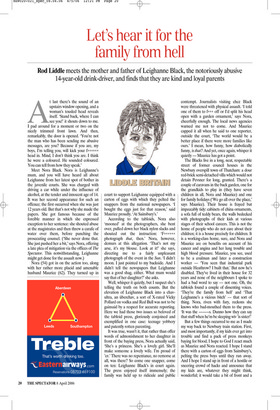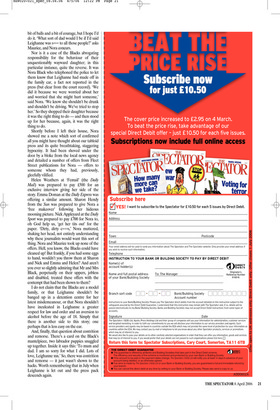Let’s hear it for the family from hell
Rod Liddle meets the mother and father of Leighanne Black, the notoriously abusive 14-year-old drink-driver, and finds that they are kind and loyal parents At last there’s the sound of an upstairs window opening, and a woman’s tousled head reveals itself. ‘Stand back, where I can see you!’ it shouts down to me. I pad around for a moment or two on the nicely trimmed front lawn. And then, remarkably, the door is opened. ‘You’re not the man who has been sending me abusive messages, are you? Because if you are, my boys, I’m telling you, will kick your f****** head in. Mind, I don’t think you are. I think he were a coloured. He sounded coloured. You can tell from how they speak.’ Meet Nora Black. Nora is Leighanne’s mum, and you will have heard all about Leighanne from her latest spot of bother in the juvenile courts. She was charged with driving a car while under the influence of alcohol, at the tender and innocent age of 14. It was her second appearance for such an offence; the first occurred when she was just 12 years old. But that’s not why she made the papers. She got famous because of the forcible manner in which she expressed exception to her sentence: she shouted abuse at the magistrates and then threw a carafe of water over them, before punching the prosecuting counsel. (‘She never done that. She just pushed her a bit,’ says Nora, offering a late plea of mitigation via the offices of The Spectator. This notwithstanding, Leighanne might get done for the assault now.) Nora (54) got in on the action too, along with her rather more placid and amenable husband Maurice (62). They turned up in court to support Leighanne equipped with a carton of eggs with which they pelted the snappers from the national newspapers. ‘I bought the eggs just for that reason,’ said Maurice proudly. ‘At Sainsbury’s.’ According to the tabloids, Nora also ‘mooned’ at the photographers, she bent over, pulled down her black nylon slacks and shouted out the instruction: ‘F****** photograph that, then.’ Nora, however, demurs at this allegation. ‘That’s not my arse, it’s my blouse. Look at it!’ she says, directing me to a fairly unpleasant photograph of the event in the Sun. ‘I didn’t moon. I just pointed to my backside. And I didn’t tell the newspapers that Leighanne was a good shag, either. What mum would say that of her daughter?’ she asks.
Well, whisper it quietly, but I suspect she’s telling the truth on both counts. But the elevation of Leighanne Black into a chavultra, an überchav, a sort of X-rated Vicky Pollard on vodka and Red Bull was not to be gainsaid by a respect for accurate reporting. Here we had those two issues so beloved of the tabloid press, gloriously conjoined and exemplified in one case: teenage yobbery and patently rotten parenting.
It was true, wasn’t it, that rather than offer words of admonishment to her daughter in front of the baying press, Nora actually said, ‘She’s a princess. She’s a lovely girl. She’ll make someone a lovely wife. I’m proud of ’er.’ There was no repentance, no remorse at all, was there? So come one snapper, come on ten: Leighanne Black’s in court again. The press enjoyed itself immensely; the family was held up to ridicule and public contempt. Journalists visiting chez Black were threatened with physical assault. ‘I told one of them to f*** off or I’d split his head open with a garden ornament,’ says Nora, cheerfully enough. The local news agencies warned me not to come. And Maurice capped it all when he said to one reporter, outside the court, ‘The world would be a better place if there were more families like ours.’ I mean, how funny, how diabolically funny, is that? And yet, once again, whisper it quietly — Maurice has got a point.
The Blacks live in a long, neat, respectable street of former council houses in the Newbury overspill town of Thatcham: a dour red-brick semi-detached villa which would not detain Pevsner for long, granted. There’s a couple of caravans in the back garden, one for the grandkids to play in (they have seven children in all, Nora and Maurice) and one for family holidays (‘We go all over the place,’ says Maurice). Their house is frayed but impeccably tidy: cabinets of china ornaments, a sofa full of teddy bears, the walls bedecked with photographs of their kids at various stages of their school careers. This is not the home of people who do not care about their children; it is a house precisely for children. It is a working-class home, sure, and Nora and Maurice are on benefits on account of his cancer and angina and her lung trouble and high blood pressure. Maurice, you see, used to be a coalman and later a construction worker — ‘You seen that industrial park outside Heathrow? I built that.’ But now he’s disabled. They’ve lived in their house for 32 years and none of the neighbours I spoke to had a bad word to say — not one. Oh, the tabloids found a couple of dissenting voices. ‘They’re the family from hell’ and ‘That Leighanne’s a vicious bitch’ — that sort of thing. Nora, riven with fury, reckons she knows who bad-mouthed them to the press.
‘It was the s. Dunno how they can say that stuff when he’m be sleeping wiv ’is sister!’ But a few things occurred to me as I made my way back to Newbury train station. First, and most importantly, if my kids ever get into trouble and find a pack of press monkeys baying for blood, I hope to God I react much as Maurice and Nora reacted. I hope I stand there with a carton of eggs from Sainsbury’s, pelting the press boys until they run away. And I hope I stand up in front of a hostile or sneering crowd of hacks and announce that my kids are, whatever they might think, wonderful; it would take a bit of front and a bit of balls and a bit of courage, but I hope I’d do it. ‘What sort of dad would I be if I’d said Leighanne was s*** to all those people?’ asks Maurice, and Nora concurs.
Nor is it a case of the Blacks abrogating responsibility for the behaviour of their unquestionably wayward daughter; in this particular instance, quite the reverse. It was Nora Black who telephoned the police to let them know that Leighanne had made off in the family car, a fact not reported in the press (but clear from the court record). ‘We did it because we were worried about her and worried that she might hurt someone,’ said Nora. ‘We know she shouldn’t be drunk and shouldn’t be driving. We’ve tried to stop her.’ So they shopped their daughter because it was the right thing to do — and then stood up for her because, again, it was the right thing to do.
Shortly before I left their house, Nora showed me a note which sort of confirmed all you might have thought about our tabloid press and its quite breathtaking, staggering hypocrisy. It had been shoved under the door by a bloke from the local news agency and detailed a number of offers from Fleet Street publications for Nora — offers to someone whom they had, previously, gleefully vilified.
Helen Weathers at ‘Femail’ (the Daily Mail) was prepared to pay £500 for an exclusive interview giving her side of the story. Emma Doman at the Daily Express was offering a similar amount. Sharon Hendy from the Sun was prepared to give Nora a ‘free makeover’ following her hideous mooning picture. Nick Appleyard at the Daily Sport was prepared to pay £700 for Nora to, oh God help us, ‘get her tits out’ for the paper. ‘Dirty, dirty c***s,’ Nora muttered, shaking her head, not entirely understanding why these journalists would want this sort of thing. Nora and Maurice took up none of the offers. Hell, you know, the Blacks could have cleaned up! But frankly, if you had some eggs to hand, wouldn’t you throw them at Sharon and Nick and Emma and Helen? And aren’t you ever so slightly admiring that Mr and Mrs Black, perpetually on their uppers, jobless and disabled, treated these offers with the contempt that had been shown to them?
I do not claim that the Blacks are a model family, or that Leighanne shouldn’t be banged up in a detention centre for her latest misdemeanour, or that Nora shouldn’t have inculcated in Leighanne a greater respect for law and order and an aversion to alcohol before the age of 18. Simply that there is another side to this story; one perhaps that is less easy on the ear.
And, finally, that question about contrition and remorse. There’s a card on the Black’s mantelpiece, two labrador puppies snuggled up together. Inside it says this: ‘To mum and dad. I am so sorry for what I did. Lots of love, Leighanne xxx.’ So, there was contrition and remorse — it just wasn’t shown to the hacks. Worth remembering that in July when Leighanne is let out and the press pack descends again.











































































 Previous page
Previous page